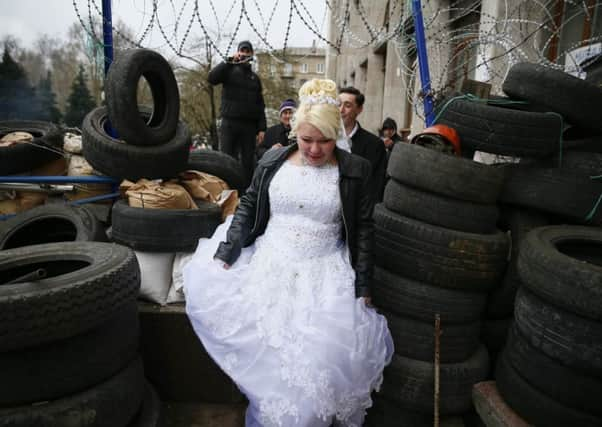Ukraine PM offers eastern regions more powers


However, Arseniy Yatsenyuk would not explain how his view differed from pro-Russian calls for autonomy within a federal state.
Mr Yatsenyuk said he favoured a peaceful solution to the standoff, which has seen protesters occupy key buildings in several cities, including Donetsk where they proclaimed a “people’s republic” and appealed to Russian president Vladimir Putin to help them.
Advertisement
Hide AdAdvertisement
Hide AdMr Yatsenyuk did not rule out storming the buildings occupied by armed men.
He did not meet representatives of the protesters but the officials he did meet urged him to allow referendums on the issue of greater autonomy, but not on secession.
“There are no separatists among us,” said Gennady Kernes, mayor of the Kharkiv region, where protesters occupied a government building earlier this week.
Ukraine’s eastern industrial heartland was the support base for pro-Russian president Viktor Yanukovich, who was ousted in February after months of protests. Last month, people in the Crimea region voted to secede and join the Russian Federation.
Russia ratcheted up the pressure on the rest of Ukraine earlier this week when Mr Putin warned European leaders of a risk to gas supplies that go through Ukraine. He has threatened to shut off supplies if Ukraine fails to pay its huge debts.
Protesters in Donetsk and Luhansk are calling for referendums on regional autonomy that could lead to a vote for inclusion in the Russian Federation, of which Crimea is now a member.
Mr Yatsenyuk said the grievances of eastern Ukraine would be met by the upcoming constitutional reform that will “satisfy people who want to see more powers given to regions”. He added that abolishing Kiev-controlled local administration could be one of the steps taken to decentralise the country.
The protesters in Donetsk, who have held the regional administration building since Sunday, initially called for a referendum on secession, but later reduced the demand to one on autonomy, with the possibility of holding another later on joining the Russian Federation.
Advertisement
Hide AdAdvertisement
Hide AdThe east of Ukraine has a high proportion of Russian-speakers, many of whom fear that the acting government in Kiev will repress them. Kiev and western officials claim Russia is whipping up tensions in the east, seeking a pretext for a military invasion.
Russia is calling on Ukraine to change its constitution to become a federalised state, a call the interim government rejects.
Nato secretary-general Anders Fogh Rasmussen, who was visiting Bulgaria yesterday, again urged Russia to pull back its troops from Ukraine’s borders.
Speaking in Prague, Czech president Milos Zeman called on Nato and the European Union to take robust pre-emptive actions to deter Russia from invading eastern Ukraine.
In north-west Romania, some 450 US and Romanian troops were conducting joint military exercises, flying American F-16 fighter jets alongside Romanian ones. Romania, Russia and Ukraine all border the Black Sea.
The EU has warned Moscow of further sanctions for ratcheting up tensions in Ukraine. A senior EU official, who spoke on the condition of anonymity, said foreign ministers from the 28 member states would meet on Monday in Luxembourg to consider broadening the list of Russians facing sanctions over the crisis.
Russian foreign minister Sergey Lavrov yesterday blamed the crisis on the West and its support for the Kiev regime which he said was illegitimate. He said the solution would be a “deep” constitutional reform in Ukraine to guarantee “non-aligned status,” meaning it would not to join the North Atlantic Treaty Organisation.